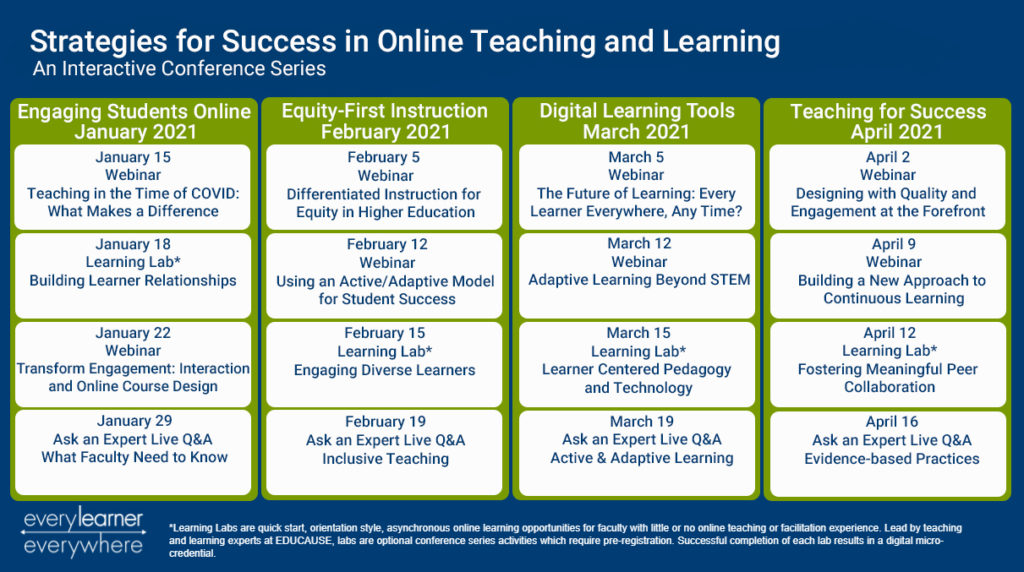Higher education instructors and administrators working in online learning are invited to participate in a new series of interactive webinars from Every Learner Everywhere and its partners.
Strategies for Success in Online Teaching and Learning is a professional development opportunity consisting of virtual presentations, learning labs, and Q&A sessions. The events are led or facilitated by experts on topics such as equity in online environments, implementing technology tools, and fostering student engagement online.
The interactive conference series is organized around four themes, each of which includes two one-hour webinars, a two-week asynchronous learning experience led by teaching and learning experts, and a Q&A session with a panel of experts.
Meeting the need for professional development
Norma Hollebeke, Manager of Network Programs and Services for Every Learner Everywhere, says the Strategies for Success conference series was designed to be comprehensive and practical without overburdening faculty. It was developed partly as a response to gaps in faculty professional development during the shift to remote learning.
“Some faculty weren’t necessarily as savvy with their learning management system,” Hollebeke says. “Others were comfortable with technology, but not as knowledgeable about online pedagogy and best practices.”
Recognizing the strain faculty have faced over the past 10 months (and continue to face) due to the pandemic, Hollebeke and her colleagues spaced the sessions out over the course of four months, one topic per month, and only requiring one hour of synchronous meetings per week.
Independent work and meeting with peers
Each month participants in the Strategies For Success conference series will learn approaches to teaching and learning that consider the needs and backgrounds of every student and ways to develop and implement equity-focused digital learning.
Webinar-style presentations are followed by weeks devoted to learning labs. These combine asynchronous activity along with peer-to-peer interaction. The labs will be particularly helpful for faculty who are new to the online format or not as comfortable with technology, Hollebeke says. Participants in the learning labs will earn microcredentials from EDUCAUSE.
Each month ends with a live panel where participants can engage with experts about how to put the theories and concepts of the series into practice in their classrooms. “That interactivity between the audience and the expert is going to give participants an opportunity to discuss problems they’re struggling with,” Hollebeke says.
Participants in the webinars and Q&A panels will receive acknowledgement of their participation or a certificate of completion. Faculty can register for individual months in the series.
Goals of the series
The goals of the interactive conference series include helping participants analyze and continuously improve practices that impact equitable teaching and learning and fostering relationships with subject-matter experts.
“Equity is at the center of this work,” Hollebeke says. “We want the educators participating to create environments where all students feel valued and have equal access to learning. The network partners designed this so participants could work with subject-matter experts and peer groups to take a deeper dive into specific topics and share those best practices.”
Highlights of the series
The themes of the four months are engagement, equity-first instruction, tools, and teaching for success. The first month kicks off with “Teaching in the Time of COVID, What Makes a Difference,” a webinar presented by Barbara Means, Executive Director of Learning Sciences Research at Digital Promise. She will discuss instructional strategies that are resilient enough for unforeseen disruptions.
That is followed two weeks later by a presentation on interaction and online course design from Professor Michelle Hampton of Cuyahoga Community College. She will demonstrate tools that create an impactful and interactive learning environment.
In the first learning lab, participants will read and discuss scholarship on what it means to build good relationships with their students. “Faculty can expect to learn how to maintain that faculty-student relationship but keep the needs of the student in mind,” says Hollebeke. “They’ll discuss ensuring you get full engagement from every student in the class.”
The first month’s series concludes with an expert panel featuring Megan Tesene, Associate Director of the Personalized Learning Consortium at the Association of Public and Land-grant Universities, Kayla Jutzi, Instructional Designer at Tulane University, and Sophia Strickfaden, eLearning Technologist at Colorado Community Colleges Online.
Other presenters and facilitators later in the conference series include Angela Gunder, Chief Academic Officer of the Online Learning Consortium, Laura Gambino, Vice President of the New England Commission of Higher Education, members of the Every Learner Everywhere Expert Network, faculty from institutions piloting innovative uses of adaptive learning technology, and representatives from other Every Learner Every network partners, among several others.
Look forward, move forward
“Above all, this conference series is reacting less and planning more,” says Hollebeke. “These are discussions about what’s next.”
“Last year felt like an emergency to many faculty teaching online for the first time. But we’ve learned higher education is much more agile than we thought. Now we know we can take these best practices back to in-classroom teaching, blended learning, or more online formats because it engages more people. This is an opportunity to embed equity into how technology is used in our classes.”
Register for the Strategies for Success in Online Teaching and Learning conference series:
· January: Engaging Students Online
· February: Equity-First Instruction
· March: Digital Learning Tools
· April: Teaching for Success



